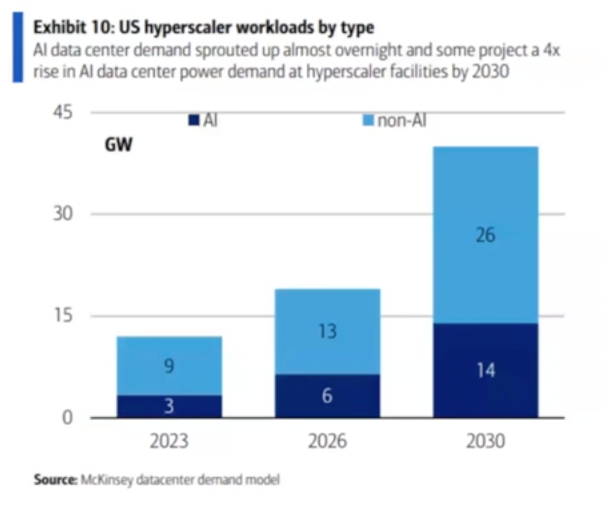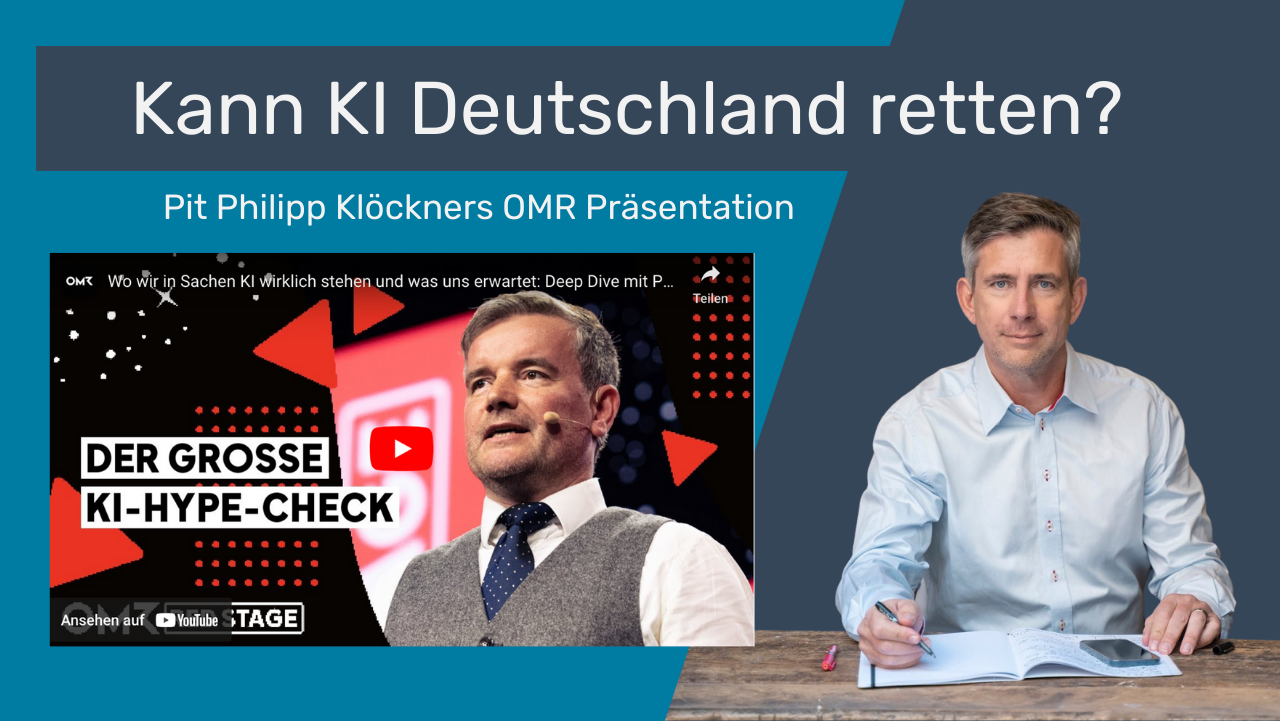
The big AI hype check
At this year's General Assembly of German Influencers ( OMRdigital trade fair with 70,000 visitors), Pit Philipp Klöckner gave the keynote speech on the topic par excellence: artificial intelligence. On 150 pages of PowerPoint, he formulated what the talk in Germany is on the subject.
What an excellent presentation. It's worth watching from start to finish. Thanks @Ole Harms, for the recommendation :)
Pit asked:
Does AI have a "moat"?
The concept comes from analyzing companies. How strong their competitive advantage is. Gartner speaks of "Peak AI" and expects the hype to cool down. In this context, the implicit question is: Is AI a hype or is AI here to stay?
The answer is: Of course. It is both.
We know that it will be another 15 years before AI has really moved into all aspects of life. (Why do we, like small children, always have to have everything the same before Christmas? Future generations will also make the breakthrough, perhaps even better, safer and more sustainable than the generations living today).
For us adults, this question is more exciting:
How well positioned is Germany for AI? Will Germany's competitiveness benefit? And thus the automotive industry?
This answer is much more exciting.
Here is the summary:
Brainpower: Do we have enough developers? Answer: ++/0
Do we have training data? Answer: -
Do we have chips? Answer: -
Do we have water for cooling? Answer: ?
Do we have enough energy? Answer: -
Do we produce quality in AI? Answer: (+)
Do we remain independent? Answer: -
In a nutshell: Under current conditions, Germany has no competitive advantage whatsoever, even though we have the technical expertise. If we all focus and work together to create the right conditions, we can still achieve something.
With the competitive advantage.
With the automotive industry.
The next few years are crucial.
Germany has brainpower
Pit quotes a study (Stanford Developer Index) according to which Germany is no. 3 worldwide in terms of the quality of AI developers. I have not been able to verify this, but it seems plausible to me. Our educational infrastructure continues to produce enough technically trained engineers.
However, the question is whether Germany creates attractive conditions for developers: Pavel Durov, CEO of Telegram, a messenger service with almost 1 billion users worldwide, initially tried to set up his company in Berlin. He had founded the "Russian Facebook" VK in Russia and had sold his company and left the country due to disagreements with the local authorities on the subject of data protection.
His first port of call was Berlin. He wanted to set up Telegram in Berlin. For many Russians and Russian speakers, Berlin is a close hub to the West. But when he wanted to set up his team of Russian programmers, he was asked to advertise all his jobs for six months, citing the applicable law. Only if he had not filled these positions by the end of this period could he move his team.
He has tried many locations: London, Singapore, Silicon Valley.
Today, Pawel Durow, Telegram and the team of programmers are based in Dubai.
Germany can produce brainpower. We have good universities and research facilities. Germany clearly has a structural disadvantage when it comes to attracting and retaining top talent.
There is not enough data.
As the number of large language models (LLMs) increases, a paradox arises at some point: the data generated by LLMs exceeds the data originally available.
Conversely, this means that less and less "natural" data is available to train the LLM. One model invents facts that the other processes, to put it bluntly.
Germany has limitations in terms of data.
This is because Europe has the strictest data protection regulations.
The logic is that the self-determination of every person must not be restricted. However, most data is generated as a result of human behavior, for example when we work, shop, pay, move around or watch a video and surf the internet in our everyday lives. All this data may only be used with the consent of the person concerned.
That is the law. And that's the right thing to do.
Then there is copyright law.
And, since a few days, the EU AI Act.
However, this restricts the data available for training.
If we think about competitors such as the USA, China, India, Russia, etc., we know that they have different cultural backgrounds and legal systems. And much more data uncritical for the training and development of LLM
A clear, unalterable disadvantage for Germany in the training of LLM.
Control over microchips
Germany is generally weak in the production of microchips.
This is not news. The German government is currently counteracting this with controversial subsidies for the construction of chip factories.
But setting up a self-sufficient supply chain takes time. It can take 5 to 7 years to build a large chip factory. Not every chip produced can be used for AI applications.
In the medium term, neither Germany nor its European partners will be able to produce sufficient quantities of microchips for the expected growth in computing power required.
Europe has critical technologies in the global chip supply chain, but will also remain dependent on supplies from the USA and Taiwan in particular.
How big is the influence of German developers on chip design? Can Germany achieve performance advantages in artificial intelligence through specially designed training or interference chips? Or will we have to make do with what others have developed?
This appears to be a clear disadvantage for Germany, which is unlikely to change significantly in the next 10 to 15 years.
Not enough water
Water is needed to cool the data centers. No water, no data centers, no artificial intelligence.
Pit talks about "water consumption": Imagine a water meter hanging on the inflow to a data center that measures how much water is used for cooling. And there would not be enough water to supply data centers.
However, the word "water consumption", as Pit uses it, is misleading.
On the one hand, chips are cooled by a coolant similar to that used in a freezer or air conditioning system.
On the other hand, water is not consumed. The amount of water in the "planet earth" system is constant. Water cannot be "consumed" in the same way that we consume gasoline or diesel when driving a car. Because it does not react and it does not disappear.
It can be polluted or be in the wrong place.
But it cannot "disappear" from the planet.
Consequently, "water consumption" indicates a transportation or treatment problem. The problem in certain populated places may be that there is not enough water to supply the population while at the same time cooling a data center.
Sufficient water can be provided anywhere in the world if it is either transported there. Or it is treated by reverse osmosis, for example. Both require a lot of energy.
The simplified formula for water scarcity is: water = energy.
For example, due to the drought of the last two years, two seawater desalination plants are being built near Barcelona in Spain, powered by solar power plants. Until these go into operation, water is being brought in by ship from the Ebro Delta, 100 km away.
In Germany, the operation of large plants with high water consumption (power stations, chemical plants, etc.) has not been a problem in recent decades, apart from periods of drought. We also have the technology in Germany,
infrastructure and operating experience for the industrial treatment and transportation of water.
Compared to other regions of the world, Germany has a clear structural advantage here.
Although "water consumption" does not really exist. So there is no competitive advantage here either.
Energy
The demand for computing capacity will increase exponentially in the coming decades with the spread of artificial intelligence in all industries and areas of life. The demand for electrical energy will also increase.
A ChatGPT prompt consumes around ten times as much energy as a Google search, and the trend is rising.
Pit puts the growth in electricity demand due to AI at +10% worldwide by 2030. But it's much more than that and much more complicated:

- The prediction for the US is that energy demand for AI will increase by FOUR TIMES by 2030 (see chart). Looking at global demand is not particularly meaningful.
- In addition, local concentrations of data centers are emerging in geographically favorable locations: a place that promises sufficient water and cooling may have little generation infrastructure so far.
- It can be assumed that data centers with a power requirement of 1 GW will require new construction projects or will be located in planned new buildings.
- Intermittent types of generation such as solar or wind are unsuitable for data centers. Load or frequency fluctuations cause damage to data centers. Accordingly, data centers need their own, cost-effective energy supply.
- This requires base load power plants powered by hydropower, nuclear power or cheap fossil fuels, which are then offset by CO2 certificates. Storage technologies are only sporadically available and make electricity even more expensive.
Both Sam Altman and Bill Gates, two icons in the AI business, are private investors in nuclear fusion start-ups and small modular reactors (SMRs). They seem to have recognized the looming global energy shortage as a problem, especially in the industrial nations.
Germany, on the other hand, with its sluggish energy transition and its many unanswered technical, administrative, legal and economic questions and high energy production costs, currently appears to be very poorly prepared for this additional demand for base load.
The topic of "Energy for AI" offers the greatest opportunity and by far the greatest need for action in Germany.
If we want to play along with AI, we need an abundance of cheap electricity. At the beginning of the last century, Germany was a leader in the production of energy infrastructure: AEG, KWU and Siemens were once the world's suppliers of electricity, power plants and grids.
Today, the suppliers of the energy transition in Germany, which manufacture solar cells and wind turbines, are from China.
Reliability
Pit states that the medical AI assistant medGemini achieves 91% accuracy in diagnosing patients. Doctors would achieve an accuracy of 89%.
This is not good enough.
While doctors can never achieve an accuracy of more than 90%, machines in the medical field with an accuracy of less than 99.9% are unacceptable. This is because humans have "common sense" - and can make good decisions in a fraction of a second. And every human being makes mistakes.
This is not a "bug": making mistakes makes us human. A machine that makes mistakes must be taken out of service.
In any case, I would always give preference to the doctor when it comes to my health.
The real problem with today's LLMs is that they do not yet provide a "truth vector". In addition to the output from a prompt, there is no indication of the extent to which the statement has "drifted". This is because along the causal chains (the vectors) that an AI processes, there are slight deviations: the logic path is correct, but the result is not quite correct.
I imagine it like a ship sailing across the ocean. The distance traveled is entered into the map as the course and route. This is called "coupling". What I don't take into account, however, are wind drift or ocean currents, for example, which cause the ship to deviate from the coupled course. With docking, I get across the ocean, but may not arrive at the planned "right" harbor.
The AI works in a similar way. Here, too, there is "drift".
With the AI, this leads to "hallucination".
Logical but incorrect results are output.
That's why we need a measure of how likely a false, hallucinated AI statement is.
I would like to see a technology and a legal requirement for the accuracy of AI developed in Germany. And, of course, the problems of privacy and copyright protection can be solved.
This would make AI usable for far more areas of application, for example medicine, science, law, production or administration.
This could be a locational advantage for Germany: "Made in Germany".
Because we can do it.
And the world would buy it.
Who else would?
Independence
Meta first changed its name to create the "Metaverse". This is obviously not yet technically possible. Now Meta has published one of the best LLMs and made it available free of charge (not yet available in Germany).
This puts the economic models of other competitors, such as ChatGPT, Google etc., under strong pressure. After all, who can still charge USD 20/month when the same service is free around the corner?
But the competition is also overwhelming for German providers such as ALEPH ALPHA. The superiority of the US tech companies is overwhelming. They are very integrated into the German and European markets. Competition supervision seems too weak in the face of the overwhelming technical and economic superiority of the American technology groups.
In May 2024, it seems impossible for a German tech company to establish itself in the international AI industry without the EU competition authority emancipating itself, asserting itself and creating space for real competition.
What Germany should do:
The situation for AI in Germany is not good, but it is not hopeless.
Our most important assets are our people, our educational infrastructure and our culture. We can do things. We can also do AI.
But we need energy. Infinite, cheap energy. Unfortunately, energy from solar and wind is not enough. We have to recognize this fact and then react.
Nor can we build our competitiveness in a multipolar world with laws alone. The size and power of the EU are not enough to regulate the market.
Competition is strong and is outside Germany and the EU. There are no friends here, but at best partners with similar interests. AI is too important for us to become dependent on this technology in the long term.

 Discovery Tools
Discovery Tools

-1-1.webp)







